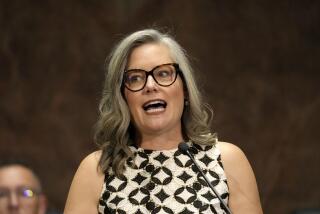Congress overrides Medicare veto
WASHINGTON — Congress delivered a stern rebuke to President Bush on Tuesday, overriding his veto of a Medicare bill and preventing pay cuts to doctors who treat seniors, the disabled and military personnel.
Despite little chance of prevailing, Bush issued the veto in the morning, declaring the bill “objectionable” because it would take funds from private health insurers to keep paying doctors and would be “fiscally irresponsible.”
But within hours, the House voted 383 to 41 to overrule him. The Senate soon followed in a 70-26 vote that was hailed by physicians and seniors.
The bill, which affects 44 million Medicare beneficiaries and more than 9 million military personnel, now becomes law.
The override, the fourth Congress has delivered to Bush in the last year, underscored the president’s weakened status as his second term nears its close.
Bush has vetoed nine bills in two years after issuing no vetoes in his first term.
The votes were part of a long-running ideological battle over the privatization of Medicare, a Bush administration priority that Democrats energetically oppose.
With strong bipartisan support for the override, lawmakers said the vote could set the stage for cooperation on healthcare reform under a new administration.
In the short term, the votes to nullify Bush’s veto postponed a pay cut that would have gone into effect the very same day, potentially forcing 60% of doctors to limit new Medicare patients, the American Medical Assn. said.
In the long run, however, lawmakers still must grope for a way to address the reimbursement issue as well as the popular program’s overall condition.
“We wasted no time in reversing the president’s carelessness and protecting our nation’s doctors and the patients they treat,” said Senate Majority Leader Harry Reid of Nevada.
Physicians celebrated.
“I’m delighted,” said Dr. Richard Frankenstein, president of the California Medical Assn. and an Orange County heart specialist. “I think this is a victory for patients over profits.”
The Medicare Improvements for Patients and Providers Act of 2008 halts a scheduled 10.6% cut in payments to physicians and institutes a 1.1% payment increase in 2009. The bill improves preventive and mental health benefits and increases an array of other services.
The bill originally passed the House, 355 to 59, then was approved in a dramatic Senate ballot, when Sen. Edward M. Kennedy (D-Mass.) took a break from cancer treatment to vote for the bill.
Neither Sen. John McCain (R-Ariz.) nor Sen. Barack Obama (D-Ill.), the presumptive presidential nominees, were present for Tuesday’s vote. California’s Democratic senators, Barbara Boxer and Dianne Feinstein, voted to override the veto.
In the midst of a tough election year, only 41 House Republicans supported Bush’s veto, while 153 voted to override it. In the Senate, Republicans split more closely, with 26 voting to support Bush and 21 voting to override.
Many Republicans objected to paying doctors by cutting more than $12 billion in payments to private insurers that offer coverage through private Medicare Advantage plans, including Blue Cross and Blue Shield.
“This is an attempt to undercut the private insurance part of Medicare that many on the other side of the aisle have never liked. It’s one of the signature achievements of the Bush administration,” said Sen. Jon Kyl (R-Ariz.).
In a sign of the vote’s importance, the powerful seniors lobby AARP made the override a “key vote,” informing 39 million members how their elected representatives voted on the issue.
The organization crowded Capitol Hill with volunteers in red T-shirts.
Peggy Wildman, 77, made the trip from Dallas to see her senators. She said she worried that without the override, she wouldn’t be able to see her doctor of 40 years.
“If I can’t go to him, who is going to take me?” Wildman asked. Her home-state senators, both Republicans, voted to override the veto.
Bush said the bill would force 2.3 million people to leave Medicare Advantage and result in higher drug costs and reduced choices.
“Medicare beneficiaries need and benefit from having more options than just the one-size-fits-all approach of traditional Medicare,” Bush said.
But Democrats depicted Bush as siding with private companies over seniors in his drive to privatize the federal program.
“Imagine vetoing a bill that allows seniors to have doctors take care of them,” said Rep. Anna G. Eshoo (D-Menlo Park). “It’s one heck of a way to gut Medicare.”
Democrats argued that the cuts to private insurers would be minimal and that patient rolls in the private programs would continue growing.
They also stressed the veto’s impact on the military. The bill affects the 9.2 million active and retired personnel and their family members who use the military’s Tricare system, which uses payment rates set by Medicare.
The annual reimbursement cuts stem from 1990s legislation that instituted small annual reductions to lower the federal deficit. Congress has usually canceled those annual cuts. As a result, they have become cumulative -- totaling 10.6% this year.
Frankenstein said the veto override prevented a Medicare “meltdown” and gave him a personal reprieve while medical groups and lawmakers worked on a solution.
“Now we have to go back and rebuild the program with a better formula, but at least we have a breather for a year and a half to do the job right,” he said.
--
More to Read
Get the L.A. Times Politics newsletter
Deeply reported insights into legislation, politics and policy from Sacramento, Washington and beyond. In your inbox three times per week.
You may occasionally receive promotional content from the Los Angeles Times.










